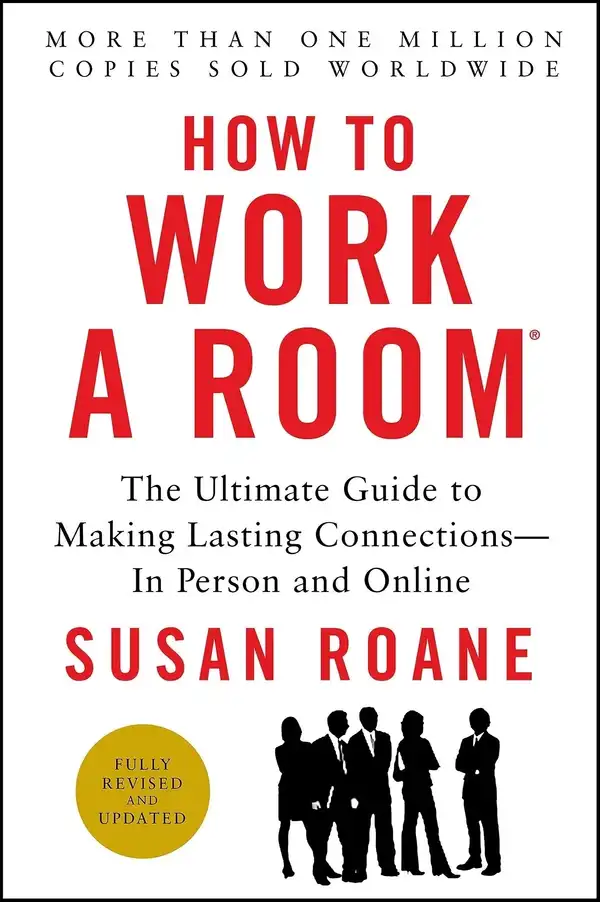Highlights
- You first have to work rooms and then you network—that ongoing process of life that is a continuous follow-up.
- But for most of us, waiting for people to introduce themselves to us is an exercise in futility. Chances are they won’t—because it’s just as difficult for them as it is for you.
- Tags: social-skills favorite
- It’s quite appropriate to approach someone in a pleasant, friendly way, smile, introduce yourself and say something like, “This is my first meeting. Is there always such a good turnout?”
- It’s a mark of real leadership to take the lead in getting to know people… It’s always a big person who walks up to you and offers his/her hand and says hello.
- Tags: social-skills leadership
- People who are good at small talk may be shy, but they are also interested in people and don’t wait to be introduced to them.
- If you don’t have any skin in the game, you never win. If you don’t take the risk and reach out to people, you never make new friends or new contacts. Most of us are strong enough to withstand a temporarily chipped ego.
- Tags: social-skills
- Take a moment to write down any negative self-talk you may have and then rewrite those statements as positive ones.
- We’re all busy, but everyone enjoys connecting with other people. I’m a valuable, likable person. Extending myself is a gift that others appreciate.
- Allow yourself to make off-the-cuff, impromptu comments. You never know—it could contribute to a very elevating experience.
- How many times have you seen someone who looked vaguely familiar but were afraid to go over because he might not be who you thought he was? I say, so what if I am wrong? The worst that can happen is that he says he’s not that person and I’ve made a new acquaintance—possibly a new friend.
- One way to muster up the courage to take a risk and talk to strangers is to ask yourself, “What’s the worst that can happen?” Surprisingly enough, your worst fear is usually not a matter of life and death. And the odds are that disaster will not occur—and that even if it does, you will survive.
- Pay no attention to people who restrain you from talking to strangers when you want to do so.
- Take five minutes to think about what you have in common with people at an event before you get there. This is the planning that helps you feel more comfortable and more prepared.
- You already have something in common with the other people in the same room, under the same roof: the purpose of the event, the traffic, the parking and the food, just to name a few.
- These common interests can be the basis for conversation. Understanding what we have in common with others takes the edge off our reluctance to approach them as “strangers.”
- The truth is that we are on our own. Before we leave for an event, we need to have a planned and practiced self-introduction that is clear, interesting and well delivered.
- Dr. Scheele suggests that the key to success is moving from guest behavior to host behavior. This has been identified as the most valuable “tip” from my audiences and readers, whether they were CEOs, engineers, entrepreneurs or hedge-fund managers.
- Volunteering to be on the greeting committee of your organization is one way to meet everyone who comes in the door; it’s your job to meet people and make them feel comfortable. You have something specific to do, and it is just the thing you want to do anyway—meet and connect with people. You have an excuse to be as outgoing as you want to be. And the benefits are bountiful.
- “Acting warmly” is self-contradictory. Either you is or you isn’t.
- The good guest attends every event, party or gathering with a self-introduction and some prepared conversation linked to the event or theme and focuses on making other guests comfortable.
- The good guest notices guests who are standing alone, starts conversations and introduces them to other guests.
- Greet the hosts, whether it’s an office, business or purely social event.
- • Circulate. Excuse yourself graciously and move on. Or bring people with you to meet other guests and help expand their circles of conversation.
- Circulate. Excuse yourself graciously and move on. Or bring people with you to meet other guests and help expand their circles of conversation.
- Fear of rejection is sometimes a self-fulfilling prophecy. When we’re afraid people will reject us, we often avoid them so that it doesn’t happen. Even when it comes at us from out of the blue, it’s hard to take.
- Starting a conversation with the person standing alone is an act of kindness.

Table of contents
Links to
Nothing yet!
Linked from
Nothing yet!